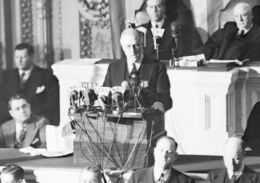The War Powers Act

President Franklin Roosevelt declares war on Japan on December 8, 1941. The Second World War was the last time the United States formally declared war in any conflict.
2,201 words
Joe Biden ordered a strike on Houthi-controlled northern Yemen in retaliation for Houthi piracy in the Red Sea on January 12, which in turn was Houthi retaliation for United States support for Israel in the ongoing Gaza conflict. This strike consisted of 150 precision-guided munitions and missiles. Five people were killed.
Instead of deterring further aggression, the strike appears to have backfired. The Houthis hailed the five people who died in the attack as martyrs, held a mass rally in their capital, and vowed further retaliation. More importantly, this could escalate into a broader regional conflict given that the Houthis are backed by Iran. Regardless of whether such a conflict is labeled as a war, it would certainly be a war.
Article II of the US Constitution states that the President is the Commander-in-Chief and thus has the power to direct wars, while Article I clearly states that Congress shall have the power to declare war.
Yet, since the Second World War American history has been filled with war, but not a single declaration of war. Aside from the obvious and perennial answer that will-to-power is more important than any legal niceties, how, then, did Biden strike the Houthis? And why is this strike not an isolated incident, but the norm?
This is due to the War Powers Act of 1973, which was passed over Richard Nixon’s veto. It provides that the President may order military action abroad due to a declaration of war, statutory authorization, or an attack upon the United States, its territories or possessions, or its armed forces.
“Statutory authorization” means permission from Congress. The act requires the President to notify Congress within 48 hours of military action and to “consult” Congress before sending troops overseas. Military action can then last for 60 days absent Congressional approval or disapproval, followed by a 30-day withdrawal period. If Congress orders an end to operations before the 60 days expire, there is still a 30-day withdrawal period.
The War Powers Act sounds like an expansion of presidential power, but it was actually passed to curtail it in response to Nixon bombing Cambodia during the undeclared Vietnam War without notifying Congress. Prior to that time, Harry Truman had dispatched troops to fight in the Korean War without a declaration of war, a conflict which he dishonestly labeled as a “police action.” This was a way to bypass Congressional approval, yet it was ironic because a police action could in theory be more extensive than a proper war.
The goal of a traditional war is to break an enemy’s will to fight, usually in relation to control of land. A police action sounds nicer than a war, but it can actually be far more extensive. A war ends when one makes peace with one’s enemies. But can the police ever make peace with criminals? A police action could in theory never end because its goals can be more nebulous, such as nation-building, ideological indoctrination, and counter-insurgency. The occupation of Iraq comes to mind.
The Korean Police Action was undeniably a real war for the troops who had to fight it and the citizens who had to pay for it. This is precisely why Congress rather than the President has the power to declare war. The Founders wanted the power to declare war to be close to the people who would have to fight and pay for it. They considered Congress to be closer to the people than the President, and thus they gave Congress the power to declare war.

You can buy Tito Perdue’s novel Opportunities in Alabama Agriculture here.
Why didn’t Congress reassert their authority in full instead of in part? The War Powers Act of 1973 was passed in the midst of the First Cold War, when a decisive and rapid response might have been needed to a crisis. Besides this, the nature of war has fundamentally changed since the 1700s; today large-scale military actions can occur with lightning speed.
The War Powers Act is also highly ambiguous. For example, Bill Clinton continued bombing Kosovo for more than 60 days without Congressional approval, but argued that Congress had implicitly authorized it by passing a bill funding it. This is despite the act explicitly saying that the approval of funding is not authorization. This may seem counterintuitive, but it is necessary, because no Congressman wants to be accused of withholding funding from the troops. It is simply bad optics. Otherwise, presidents could send troops into combat and then exploit them as hostages to obtain Congressional approval.
Clinton got away with it, though. When a group of Congressmen sued Clinton in Campbell v. Clinton for violating the War Powers Act, a DC circuit court held that the Congressmen lacked the standing to bring a case. In constitutional law, the plaintiff needs to have standing before he can proceed. The crux of standing is that the plaintiff has a real injury which can be addressed by the court. Lack of standing dooms many cases before they can even begin. In this case, the court seemed to think they shouldn’t get involved, in part because the crisis had already passed and hence the issue was moot — a legal term for a situation where a court won’t hear a case because the underlying problem no longer exists, leaving nothing to decide. It also helped that Clinton had ceased bombing within 90 days (60 days plus the 30 days to withdraw).
But an exception to the general rule on mootness exists in the case of issues which are “capable of repetition yet evading judicial review.” This exception was carved out for abortion cases because it is unlikely that a woman can get a case heard within nine months, but can become pregnant again and again. But this exception can also apply to issues besides abortion. The War Powers Act should fit this exception to the general rule on mootness perfectly, because the time frame is 90 days instead of nine months, and presidents can violate the act in one foreign intervention after another.
In Campbell vs. Clinton the court dismissed the case, stating that “[a]bsent a clear impasse between the executive and legislative branches, resort to the judicial branch is inappropriate.” Aside from standing and mootness, this is a reference to the fact that courts are reluctant to hear “political questions.” This is the excuse the Supreme Court used to dodge having to take a side in the stolen election of 2020, thus allowing whoever had the greater will-to-power to prevail.
The court indeed rejected Clinton’s stance that every lawsuit brought by Congressmen for violating the War Powers Act would be a non-justiciable political question. But actions speak louder than words. Not a single group of Congressmen has ever successfully sued over a violation of the War Powers Act.
If it is doubtful that the courts will intervene, then it is up to Congress to stick up for themselves. For example, even if they approve funding for the troops, Congress could retaliate in other ways by refusing to fund other projects and pass other bills. But this scenario is almost as unlikely as the courts becoming involved. Congress has had ample opportunities over the last half-century, including Congressmen and presidents from both major parties. The power of the purse simply isn’t what it used to be.
At some point, despite all their feeble whimpering to the contrary, Congress has indeed consented to presidents usurping their power to declare war because their conduct has all but ratified that usurpation. Perpetual victimhood is a choice.
This flows into the question of whether the War Powers Act is constitutional to begin with. While Nixon thought it was unconstitutional because it limited his power as Commander-in-Chief, others argue that the act is unconstitutional because it transferred one of Congress’s delegated powers to the President.
As argued by the Tenth Amendment Center, this essentially allows Congress to pass the buck — which they are not authorized to do, “not for sixty days, or one day, or even one minute.” I admit this is a particularly rigid reading of the Constitution, especially in light of the realities of modern war and geopolitics. But declaring war isn’t only Congress’ right; it is a duty. With power comes responsibility, and so by delegating their war powers to the President, Congress also shirks their responsibility. Congress is supposed to be accountable for pulling the trigger, not act as a rubber stamp. And yet the President is not fully responsible either, because he can argue that Congress assented through the act.
The War Powers Act didn’t just shift responsibility, but diluted it so that neither Congress nor the President are truly accountable anymore for war and its grave consequences.
Democracy is frequently praised for its supposed accountability and responsiveness. But a lack of accountability and disregard for the will of the people have proven to be perennial problems in representative liberal democracy.
In a recent study by the Homeland Institute of white voters, 68.4% of respondents opposed direct intervention in Gaza via airstrikes or boots on the ground. It’s not unreasonable to assume that opposition is higher among non-whites, who may erroneously see Israel as a white colonial power. If the Gaza conflict escalates, it will be just another example of how ordinary Americans almost never get the policies they want unless the rich or interest groups want them as well.

You can buy Georges Sorel’s Reflections on Violence from Imperium Press here.
And if it turns out that such an escalation comes with a heavy cost, who will be accountable? Will Biden and his cabinet, Congress, the Zionist lobby, or Raytheon executives suffer any real consequences? In what proportion should we blame each of them? Liberal democracy can create mountains of dead bodies through bad decisions, and we won’t even know at whose feet to lay them.
Furthermore, there is inherently a major loophole in the War Powers Act. What if a President orders a strike or other operation with the expectation that it will trigger a response which will then either justify further military action under the act, or pressure Congress to formally declare war? For example, what if Biden were to launch an extensive campaign against the Houthis and antagonize Iran in the hope that they would then retaliate, and thereby trigger the act’s provision about attacks on the US or its armed forces? This doesn’t seem unlikely given that Biden has already announced Operation Poseidon Archer.
The question of war powers is highly ambiguous. Such ambiguity is great for testing the analytical skills of law students on an exam, but it is no way to run a country, certainly not in relation to something as deadly serious as war. It’s also downright embarrassing that we don’t know who has the power to declare war in a country that stylizes itself as the foremost superpower and a shining example for the rest of the world to follow.
The ambiguity of war powers also highlights that the Founders were wrong in relying too much on structural solutions. “Let ambition check ambition” fails if only one side is ambitious and well-funded. Oswald Spengler’s critique which holds that “[i]t is symptomatic that no constitution knows of money as a political force, it is pure theory that they contain, one and all” has been vindicated yet again.
Even if the War Powers Act was to be overturned and Congress had to again declare war, it would not be enough. All a President would need to do is send a text message to every Congressman telling them that there is an emergency, and that if they are patriots who love our “greatest friend and ally,” Israel, they will immediately report to DC to vote “yes” on a declaration of war. As a result of a combination of lobbying and blackmail, they would scurry aboard the next available jet in order to betray their constituents as soon as possible.
Real leaders sometimes need to act outside or even contrary to the law. I fully agree with Carl Schmitt that “[s]overeign is he who decides on the exception.” Sometimes the law must recede and the state remain, because survival comes first. But am I talking out of both sides of my mouth when I say that we ought to have clear rules?
No, because while rules were made to be broken and their contours are defined by their exceptions, they should be broken openly and honestly so that there is accountability. Because rules are never clear, accountability should be.
A President who bypasses Congress to declare war should be prepared to stake his career on being vindicated — and perhaps a whole lot more than just his career. While I agree with the Founders that declarations of war should generally be close to the people who fight and pay for them, I care less about who declares war and more that they do so responsibly as a result of being held accountable.
A rule that is a clear, bright line on war powers would increase accountability, regardless of whether the person who ultimately declares war does so within or outside that rule. Until then, we are stuck in the bureaucracy of liberal democracy, where everybody — and thus nobody — is truly to blame for anything.



